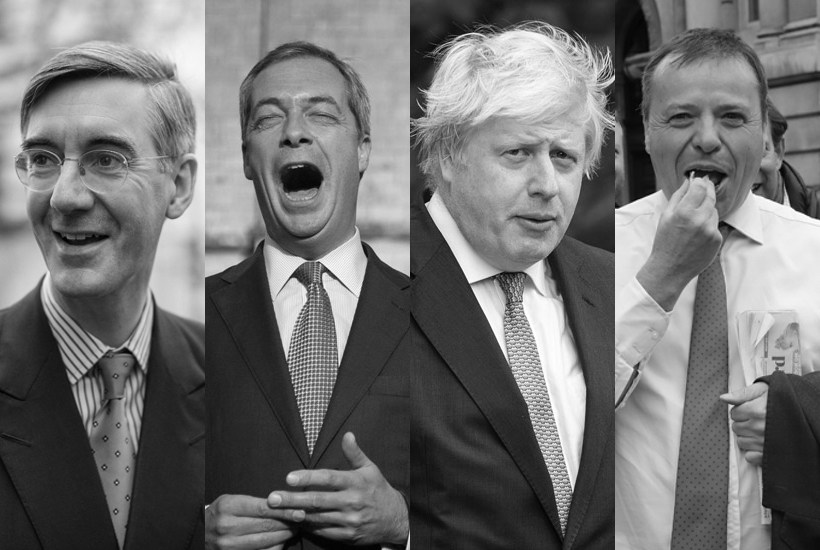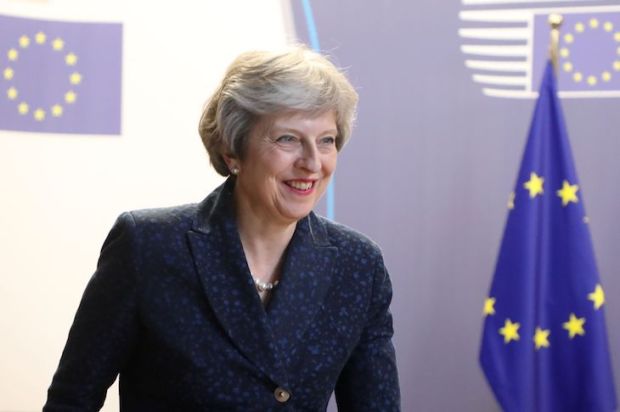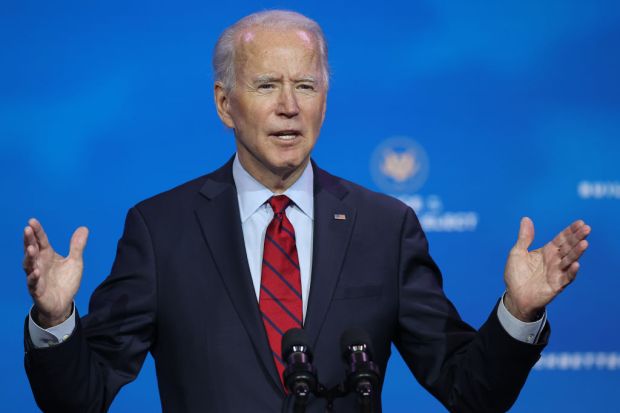What do Boris Johnson, Jacob Rees-Mogg and Dominic Cummings all have in common? They are Brexiteers, of course. Yet little is it known that they all studied history or classics at university. Add to this list John Redwood, Bill Cash, Daniel Hannan, Owen Paterson and Douglas Carswell — some of the most influential Eurosceptic MPs from the past 30 years. Michael Gove may have studied English literature, but as education secretary he sought to establish a ‘narrative of British progress’ in the history curriculum. Boris has written a biography of Winston Churchill and Nick Timothy has written a biography of Joseph Chamberlain. Even two of the so-called ‘Bad Boys of Brexit’, Arron Banks and Nigel Farage, are self-proclaimed history buffs. After claiming that Ancient Rome was ‘destroyed’ by immigration, Banks was called out by classicist Mary Beard, to which he retorted: ‘I studied Roman history extensively — you don’t have a monopoly on history!’ Nigel Farage is a regular visitor to the battlefields and cemeteries of Europe.
Why is this significant? Much has been made by the liberal left of the association between Brexit and nostalgia, whether it be the dream of returning to an imperial past or the restoration of parliamentary sovereignty. Take Back Control. And the implication of nostalgia is not a positive one; after all, when the term was first coined it referred to a medical condition. Many opponents of Brexit would argue that Brexiteers do have a medical condition — Anna Soubry has already said that all the banging on about Europe is ‘not particularly good for their [the Brexiteers’] mental health’. It may be nostalgia for some, but for others, such as the Question Time audience member who rebuffed Matt Forde last May, Brexit is about ‘the future not the past’.
And if nostalgia is unhelpful, then so too is amnesia. In the UK our past is not comprehensively taught — hence Gove’s reforms; and when it is, it is often the subject of derision. I am not suggesting that anyone who studied history or has a similar degree is a Brexiteer — far from it in fact. More than 300 prominent historians signed a letter to the Guardian before the referendum encouraging Britain to Remain. Yet it is no coincidence that many of the leading Brexiteers have. Whereas the Declaration of Independence is gospel in America, in the UK only a history graduate like Jacob Rees-Mogg could describe the White Paper agreed at Chequers as ‘the greatest vassalage since King John paid homage to Philip II at Le Goulet in 1200’. The pollsters at Vote Leave decided that ‘Take Back Control’ was the most effective slogan, but what it communicates is the doctrine which the History Boys continue to espouse: parliamentary sovereignty. If you know your British history, then you’ll known that this is not an abstract idea but something which parliamentarians have wrestled for since, well, not long after Le Goulet.
In comparison, the leading opponents of Brexit such as Ken Clarke QC, Keir Starmer QC, Tony Blair, Chuka Umunna, Anna Soubry and Matthew Parris all read law or jurisprudence at university. To be sure, they have appealed to the doctrine of parliamentary sovereignty, but only since the referendum, and in order to soften the withdrawal process. Harold Wilson and Ted Heath, the prime ministers who brought the UK into the European Economic Community, studied the now-infamous philosophy, politics and economics. So too did Michael Heseltine, David Cameron, Peter Mandelson, the Miliband brothers, Yvette Cooper and Will Straw, the director of the Britain Stronger in Europe campaign. Does this point to conspiracy? No. But it is an interesting pattern to highlight. The old ruling class — politicians such as Herbert Asquith, Harold Macmillan and Boris — studied the classics. The new ruling class — the ‘experts’ — have studied vocational degrees like law and PPE. Whereas our rulers were once versed in the past, they are now versed in technocracy.
Of course, there are exceptions to the rule and I am not suggesting that those who oppose Brexit have not studied history or are not interested in it (Dominic Grieve and George Osborne, for instance, read history). But it does not seem too unreasonable to presume that many of the influential opponents of Brexit in politics and the media do so because of their education. If you studied modules on European law or international political economy at university, rather than, say, the Glorious Revolution, it is not surprising that you will come to prioritise the global over the national, the present over the past. Undoubtedly the lawyers ‘understand the importance of statute’, as Soubry put it, but do they understand the importance of history? Magna Carta and what it stands for becomes one of many legal cases to memorise, not a founding national document.
Where does this leave Brexit? I’ll leave the detail to Theresa May, but I suspect that the outcome she achieves will not end this Thirty Years War between our representatives. This is a war which began, and which may have to be settled, on campus. To be sure, such a divergence of outlook among political representatives is not new. Following the French Revolution, Edmund Burke reflected on the fact that the Third Estate, the body of men which came to dominate the legislature in 1789, was composed mainly of lawyers. Fuelled by Enlightenment theories and self-interest, they overturned the ancien régime.
In our case, forget the Bad Boys of Brexit: 23 June 2016 was the work of the History Boys, and its destiny lies with whichever group of graduates holds the balance of power.
Got something to add? Join the discussion and comment below.
Get 10 issues for just $10
Subscribe to The Spectator Australia today for the next 10 magazine issues, plus full online access, for just $10.
You might disagree with half of it, but you’ll enjoy reading all of it. Try your first month for free, then just $2 a week for the remainder of your first year.















Comments
Don't miss out
Join the conversation with other Spectator Australia readers. Subscribe to leave a comment.
SUBSCRIBEAlready a subscriber? Log in